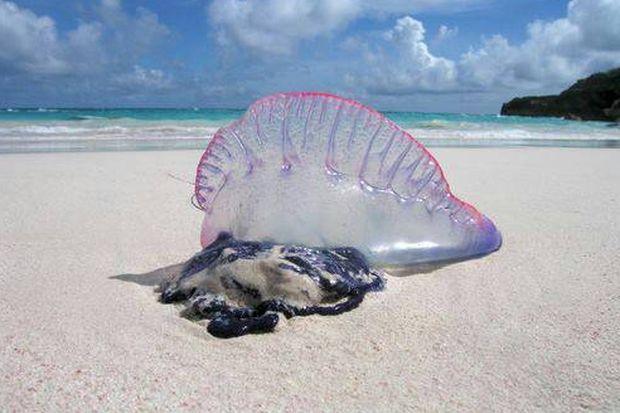
Swimmers in the Phi Phi islands of Krabi have been warned that venomous jellyfish-like creatures known as Portuguese man-of-war have been spotted in the sea there, amid reports an alarming number were found on Phuket beaches on Monday.
Portuguese man-of-wars, also known as bluebottles, were found along Nai Yang, Nai Thon and Layan beaches in nearby Phuket on Friday, leading to a ban on swimming and all water activities at the three spots.
They are among the world’s most venomous marine species. Stings from blue bottles can be very painful and in extreme cases fatal.
Suwanna Sa-ard, assistant to head of the Hat Nopparat Thara-Mu Ko Phi Phi Marine National Park, said park officials found a veritable flotilla of bluebottles at Maya beach on Phi Phi Leh island on Monday morning, and were checking other islands to see if there were more of them. Swimming was banned at Maya beach and visitors were warned to be vigilant at other beaches.
The park had asked hotel and tour boat operators to help distribute warning flyers while signs were being prepared for erection at all beaches under the park’s supervision, she said.
Maya beach is a renowned little sandy cove on Phi Phi Leh, one of the six islands that make up the Phi Phi archipelago.
Park chief Sarayut Tantian warned people they should not use vinegar to treat a bluebottle sting, as sometimes advised, as it would aggravate the area of the sting. Instead, rinse the stung area with seawater, remove tentacles by scraping with a plastic card and quickly take the injured person to the hospital.
Teams from Sirinath National Park inspected Nai Yang, Nai Thon and Layan beaches, where a swimming ban was imposed, along with other beaches in Phuket, covering a distance of six kilometres. They collected a total of 145 live and dead bluebottles, with many of them being found between Mai Khao beach in front of the JW Marriott Phuket Resort & Spa and Sai Kaew beach.
The team described the number being discovered as “worrying” and said they would continue to patrolling both the sea and beaches for at least the next three days.